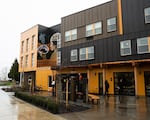While most Portlanders are stuck at home, the city still needs to function.
A day after Gov. Kate Brown issued her statewide stay-at-home order, some of Portland’s top officials gathered to recap the city-specific actions underway to slow the spread of COVID-19 and mitigate the economic fallout.
In the midst of a Tuesday downpour, the mayor joined several bureau and office heads at the city’s downtown fire station to update the public. Here are some highlights:
Policing
Though violating the governor’s order is a misdemeanor, Portland Police Chief Jami Resch made it clear that criminal citations will be a “last resort.” Instead, she said, the bureau is taking an “educate-first approach” — explaining to people what the order means and why they need to stay in their homes. This approach, she noted, was particularly critical when interacting with people who are experiencing homelessness, who may not be aware of the health crisis, much less the governor’s order.
Related: FAQ: How Life Will Change More Under Oregon Governor's Stay-Home Order
The current stay-at-home order is vague when it comes to what people without homes are supposed to do, as the Oregonian has reported. While other states have made exceptions in crafting their order for people experiencing homelessness, Brown's did not.
If people are looking to report someone violating a part of the order, Resch said they should do so on the non-emergency line. Both Resch and Portland Fire Chief Sara Boone made a plea to Portlanders to not overburden the 911 system, which they expect to start seeing more calls as the number of COVID-19 cases climb.
“Call a non-emergency number, call 211, but the 911 system is for people who are experiencing severe respiratory distress, high temperature, extended coughs,” Boone said. "We are preserving the capacity on the response side.”
Resch noted that the number of 911 calls has dropped by 10% compared with the 10-day period prior to March 12, when Mayor Ted Wheeler declared a state of emergency. But the police bureau has seen a concerning uptick over that same period: Calls related to suicide threats or attempts rose 23%. And that’s a 41% increase from the same period a year before.
"I ask everyone to reach out by phone, text or video chat to connect with your family, friends and neighbors if they are struggling," Resch said. "Make sure they know how to access help, which is available through the mental health crisis intervention line or Lines For Life."
There’s also been national concern about an increase in domestic violence, as people may be quarantined in their homes with an abusive partner. Resch said that due to the way these calls are coded, she’s not able to tell whether Portland has seen an uptick.
Housing and homelessness
As coronavirus threatens to dramatically slow development across Portland, Wheeler said Monday that the Bureau for Development Services is prioritizing permits for affordable housing developments sponsored by the city’s housing bureau, in order to “keep housing for low-income Portlanders on track.”

A mural by Toma Villa adorns the exterior of Nesika Illahee in the Cully neighborhood in Portland, Ore., Wednesday, Jan. 29, 2020. Nesika Illahee is an affordable housing community developed in partnership with the Siletz tribes to address homelessness.
Erica Morrison / OPB
As for those experiencing homelessness, the mayor said Portland is continuing to open up new shelter beds, as the city’s current stock of shelters are unable to operate with their current numbers while maintaining 6 feet of distance between people showing common symptoms of COVID-19, including coughing, fever and shortness of breath.
Related: Cramped In Shelters And Campsites, Portland's Homeless Brace For Coronavirus
The mayor said he expects the East Portland Community Center to be converted into a shelter by Thursday. The city has already transformed the Charles Jordan Community Center and the Oregon Convention Center into temporary shelters.
City leaders said, as of Monday, they’d stop clearing out homeless camps. That’s after the Centers for Disease Control and Prevention came out with guidance that warned against cities breaking up encampments, as it would increase the potential for the disease to spread. Wheeler said the city will make exceptions for a camp that puts “the campers in the direct line of danger,” such as a tent where someone could be hit by a car.
Small businesses
More on this to come. The mayor highlighted that commercial rent in city-owned properties has been deferred for three months, but he said there’s more in the pipeline. The city has scheduled a press conference on housing and economic relief for Thursday.
Related: Portland Service Industry Reeling And Uncertain With NBA, MLS On Hold
Tom Rinehart, the city’s chief administrative officer, also said Portlanders should “stay tuned” for news on helping businesses, but said he did not yet know whether the city’s new arts tax will be delayed. Rinehart said Portland planned to follow the state’s lead on deferring taxes. Though President Donald Trump pushed the filing deadline back for federal taxes, Brown has not yet said whether the filing deadline in Oregon will be deferred.
Rinehart noted that the city has temporarily stopped collection on past due taxes.
State of emergency
Portland's state of emergency, which only lasts for two weeks before it must be renewed, is set to expire on Wednesday. Wheeler said he plans to renew it and will continue to do so until next month at least.

Morning rush hour emptied of cars in downtown Portland, Oregon during coronavirus pandemic, March 20, 2020.
Stephani Gordon / OPB
Wheeler said he’s heard from public health officials that the state will likely hit its peak caseload in the first two weeks of April and then there will be a period of time beyond the peak where the state of emergency will be continued. Until then, he said, his message is clear: Stay home, don’t travel.
“We collectively control today how deep and how long this crisis lasts through our own behavior,” he said. “My actions impact your health. Your actions impact my health.”
